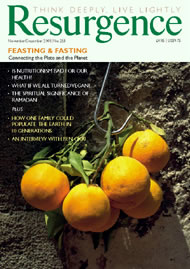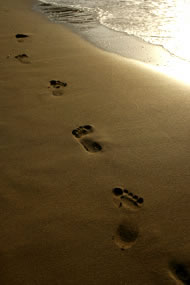THE MARVELLOUS THING about reading this book is that, at the end, you feel as though you have read about fifty. Most of the authors on my non-fiction reading list (many of whom I haven’t got around to yet) are here: there is Tom Hodgkinson on doing nothing, A. C. Grayling on modern lives, Oliver James on “affluenza”, Colin Tudge on feeding people, and Rosie Boycott on her life in the country. When you add in the books that are referred to, the list gets even stronger: Richard Layard on happiness, Alain de Botton on philosophy, and Barbara Ehrenreich on her wonderful concept of “collective joy”. The politicians are here too: David Cameron, Hilary Benn and Caroline Lucas.
The result is a bit like one of those conversations where you think you are discussing one thing but you have to haul in several other topics along the way. You might be talking about lowering carbon footprints, but then you remember that if you walk to work you will be not only less carbon-profligate, but also more likely to meet friends, more cheerful, healthier and (no transport fares or gym subscriptions) richer, too. For a moment, you can glimpse a vision that links everything that is wrong with your life, and – hey presto! – everything that could help to put it right.
Like a prism, this book’s different facets add up to one illuminating whole. Nowadays it is not enough, however distinguished an expert you are, simply to look at the world through the eyes of business, economics, politics, philosophy, psychology, design, society or good food. You need to know about all of these things, at least in outline, and to see how they fit together, both historically and in the ways in which they are changing today. Here, twenty-three of the most illuminating and imaginative writers in these fields are gathered together and asked one question: “Do good lives have to cost the Earth?”
The answer, of course, depends on what you mean by ‘good’. The editors, Andrew Simms of the New Economics Foundation and Joe Smith, who lectures on environmental change for the Open University, define ‘good’ lives as lives that are “pleasurable, purposeful and just”. Grayling writes, “it is the quality of the emotional tenor of a life that makes it good or bad; bad if it is scarred by unhappiness, grief, failure, bitterness, good if it is illuminated by love, attainment, affirmation and respect from people one respects.”
This is a cheering book for anybody who thinks sustainability and environmental awareness are all about sacrifice and discomfort. In fact, there is quite a strong thread of reaction against what the editors call “mournful pessimism”. The last thing we need, says Kevin McCloud, in an impassioned argument for the role of good buildings in improving our lives, is “a new reformation”, turning us into “dour, ethically-shrunken minimalists”.
Rather than urging us to give things up, these essays ask us to grasp new opportunities. Their power lies in their vision of how things could be. The late Anita Roddick’s vision of billboards which are not allowed to sell products but only “poetry, wit and art” is compelling, as is David Goldblatt’s call for an understanding that sport, and all play, is about “delight, experimentation and creativity”, Ann Pettifor’s assertion that we really can afford all the schools and hospitals we need, and Colin Tudge’s wonderful description of an ideal education as “everyone on this Earth asking, as a matter of course, what it is right to do, and why”.
Three things hold together these authors’ disparate approaches: good editing, unpretentious writing and a sound knowledge of their area of expertise. Structure is provided by a general introduction which sets the context for the essays which follow, and by brief introductions to each group of essays, organised into sections with titles such as ‘Having a Good Time’, ‘Good Money’, ‘Good Designs’ and ‘The Politics of a Good Planet’. With so many topics covered, and so many thinkers referred to, the lack of an index is the book’s greatest drawback.
The essays are neither waffly nor wordy; there is an impressive degree of economic literacy, of the kind that will hopefully make unconverted economists sit up and listen to ecological arguments. In particular, Pettifor’s account of the world banking system and the real nature of debt is enlightening and gives intellectual weight to her assertion that “the world really does not have to be like this. We can change it.”
.






